30 dec 2012
Egypt allows first batch of Qatar's reconstruction aid in Gaza
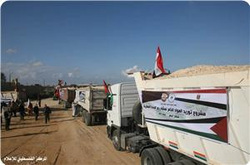
Truckloads of construction materials started on Saturday evening to enter the war-torn Gaza Strip through the Rafah border crossing as part of the Qatari reconstruction aid.
An official source at the Rafah crossing told the Palestinian information center (PIC) that for the first time since the besiege of the Gaza Strip, 20 trucks laden with different construction materials and decorated with Palestinian, Qatari, and Egyptian flags and banners were allowed in by the Egyptian authorities.
The official added that the first batch of the Qatari aid is composed of 100, 000 tons of construction materials and will be used to initiate the first stage of Qatar's reconstruction projects in Gaza.
Palestinian premier Ismail Haneyya stated earlier that Egypt told his government that it would allow the crossing of truckloads of construction materials funded by Qatar into Gaza.
Premier Haneyya expressed his deep appreciation to Qatar and Egypt for their humanitarian efforts and said that Egypt is today different from yesterday and can never accept being involved in the blockade imposed on Gaza people.
For his part, Palestinian lawmaker and head of the popular committee against the siege Jamal Khudari hailed the Qatari-Egyptian reconstruction efforts in Gaza as a big step to end the blockade and strengthen the steadfastness of its people.
An official source at the Rafah crossing told the Palestinian information center (PIC) that for the first time since the besiege of the Gaza Strip, 20 trucks laden with different construction materials and decorated with Palestinian, Qatari, and Egyptian flags and banners were allowed in by the Egyptian authorities.
The official added that the first batch of the Qatari aid is composed of 100, 000 tons of construction materials and will be used to initiate the first stage of Qatar's reconstruction projects in Gaza.
Palestinian premier Ismail Haneyya stated earlier that Egypt told his government that it would allow the crossing of truckloads of construction materials funded by Qatar into Gaza.
Premier Haneyya expressed his deep appreciation to Qatar and Egypt for their humanitarian efforts and said that Egypt is today different from yesterday and can never accept being involved in the blockade imposed on Gaza people.
For his part, Palestinian lawmaker and head of the popular committee against the siege Jamal Khudari hailed the Qatari-Egyptian reconstruction efforts in Gaza as a big step to end the blockade and strengthen the steadfastness of its people.
25 dec 2012
700 houses destroyed in al-Furqan war have not been reconstructed
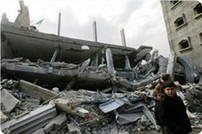
Nearly 700 houses, destroyed during the 2008-2009 Israeli war on Gaza, have not been reconstructed till now, stated the Palestinian Center for Human Rights in a report about the right to housing and the situation of owners of the destroyed houses.
The human rights center said in the report that the policy of destruction pursued by the occupation against the citizens' houses has started since 1967, but has been remarkably escalated since the Al-Aqsa Intifada in September 2000, during which the occupation had destroyed 11,809 houses.
It pointed out that 5,403 houses were destroyed during the Furqan war and 286 houses during the recent aggression on Gaza in the last November; including 126 houses that have been completely demolished.
The Center noted that the Israeli siege imposed on the Gaza Strip since 2006 has caused a disastrous situation at the level of the right to housing because of the restrictions imposed on the entry of the construction materials through the crossings.
According to the report, the responsible authorities said that there were several reasons for not initiating the construction of the 700 houses, noting that some of these houses had been built on governmental land or in dangerous border areas.
It also pointed to the suffering of the owners of the destroyed houses due to delaying the process of the rebuilding of their homes as well as the deterioration of their humanitarian situation.
The report indicated that the UN Relief and Works Agency for refugees "UNRWA" has been building houses for the refugees, while the United Nations Development Program, al-Rahma Foundation, the Palestinian Housing Council and the Ministry of Housing has been building homes for the non-refugees.
The main cause behind the delay in the reconstruction of the destroyed houses for three years, after the end of the war on Gaza, is the siege imposed by the Israeli occupation forces and which prevents the entry of the construction materials to the Strip.
Starting importing the construction materials from Egypt through the tunnels on the Palestinian - Egyptian borders, led to partly overcoming the problem of the blockade and allowed the construction of hundreds of homes that had been destroyed.
The Palestinian Center for Human Rights demanded the Palestinian government to adopt urgent programs to provide the families whose houses had been destroyed during the aggression with housing and the basic necessary services.
The Center proposed the construction of a residential complex, composed of several residential buildings, on a plot of land allocated by the government to accommodate these families.
It also called on the United Nations, its specialized agencies, and the Special Rapporteur of the right to adequate housing to force the occupation authorities to abide by the norms and the basic human rights, approved by the United Nations, and in particular the right to adequate shelter.
The human rights center said in the report that the policy of destruction pursued by the occupation against the citizens' houses has started since 1967, but has been remarkably escalated since the Al-Aqsa Intifada in September 2000, during which the occupation had destroyed 11,809 houses.
It pointed out that 5,403 houses were destroyed during the Furqan war and 286 houses during the recent aggression on Gaza in the last November; including 126 houses that have been completely demolished.
The Center noted that the Israeli siege imposed on the Gaza Strip since 2006 has caused a disastrous situation at the level of the right to housing because of the restrictions imposed on the entry of the construction materials through the crossings.
According to the report, the responsible authorities said that there were several reasons for not initiating the construction of the 700 houses, noting that some of these houses had been built on governmental land or in dangerous border areas.
It also pointed to the suffering of the owners of the destroyed houses due to delaying the process of the rebuilding of their homes as well as the deterioration of their humanitarian situation.
The report indicated that the UN Relief and Works Agency for refugees "UNRWA" has been building houses for the refugees, while the United Nations Development Program, al-Rahma Foundation, the Palestinian Housing Council and the Ministry of Housing has been building homes for the non-refugees.
The main cause behind the delay in the reconstruction of the destroyed houses for three years, after the end of the war on Gaza, is the siege imposed by the Israeli occupation forces and which prevents the entry of the construction materials to the Strip.
Starting importing the construction materials from Egypt through the tunnels on the Palestinian - Egyptian borders, led to partly overcoming the problem of the blockade and allowed the construction of hundreds of homes that had been destroyed.
The Palestinian Center for Human Rights demanded the Palestinian government to adopt urgent programs to provide the families whose houses had been destroyed during the aggression with housing and the basic necessary services.
The Center proposed the construction of a residential complex, composed of several residential buildings, on a plot of land allocated by the government to accommodate these families.
It also called on the United Nations, its specialized agencies, and the Special Rapporteur of the right to adequate housing to force the occupation authorities to abide by the norms and the basic human rights, approved by the United Nations, and in particular the right to adequate shelter.
16 dec 2012
There are promises to reconstruct buildings destroyed by recent aggression
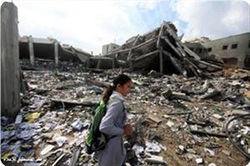
Secretary General of the Palestinian Cabinet in Gaza Strip, Abdel-Salam Siam, stated that the government had received promises from some countries for the reconstruction of what was destroyed the recent aggression on the Gaza Strip.
Siam said in a press statement on Sunday that what is happening now is an exchange of information needed for reconstructing what has been destroyed by the occupation
He pointed out to the positive relationship with the Egyptian side who gave positive promises to end the file of the travel ban lists and to increase the number of the travelers through Rafah crossing.
He explained that the government continued to provide assistance to the destroyed houses' owners and displaced families during and after the aggression, pointing out to the formation of ministerial committees by the Ministry of Public Works and Housing and Social Affairs specialized in offering help to the affected citizens.
He pointed out that the reconstruction campaign of the security services' headquarters will begin soon, praising the Turkey's role as a leader in all fields, and pointing out that the Palestinian people look forward to greater Turkish role in all fields to support the Palestinian cause.
Siam said in a press statement on Sunday that what is happening now is an exchange of information needed for reconstructing what has been destroyed by the occupation
He pointed out to the positive relationship with the Egyptian side who gave positive promises to end the file of the travel ban lists and to increase the number of the travelers through Rafah crossing.
He explained that the government continued to provide assistance to the destroyed houses' owners and displaced families during and after the aggression, pointing out to the formation of ministerial committees by the Ministry of Public Works and Housing and Social Affairs specialized in offering help to the affected citizens.
He pointed out that the reconstruction campaign of the security services' headquarters will begin soon, praising the Turkey's role as a leader in all fields, and pointing out that the Palestinian people look forward to greater Turkish role in all fields to support the Palestinian cause.
9 dec 2012
Al-Ghuraiz called on Arab and international institutions to reconstruct Gaza
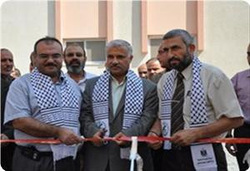
Minister of Public Works and Housing in Gaza strip, Dr. Yusuf Subhi Al-Ghuraiz, said that the Palestinian government has paved the way for all Arab and international institutions to contribute in the reconstruction of the Gaza Strip.
The Gaza government will provide all the necessary services and facilities for the implementation of the institutions' projects in the reconstruction, he noted.
The minister's statements came during the honoring ceremony for the victims of the recent Israeli aggression held by al-Rahma association for Relief and Development attended by Kuwaiti delegation headed by Dr. Walid Al-Anjari representative of the al-Rahma international association in Kuwait and a group of national figures.
The minister stressed that the Palestinian government raised the slogan of "one hand builds and another resists", where the government bore its responsibilities in alleviating the pain and suffering of our people during the recent aggression on Gaza that caused about a billion and a quarter billion dollars losses, where it destroyed the strip's infrastructure and a number of companies, houses, the headquarters of the government and a number of institutions.
Gaza government has not yet completed the reconstruction of the damage caused by the Israeli aggression in the 2008-2009, the minister said.
The minister pointed out during his speech to the losses caused during the barbaric aggression on the Gaza Strip, where 191 Palestinian were killed and more than 1500 were wounded, most of them children, women and the elderly.
"This aggression did not respect the international laws and norms in targeting civilians, journalists and ambulance crews," the minister confirmed, saying that this aggression is not the first in the history of the Palestinian people, but it is preceded by many Israeli aggressions which have been accompanied by frequent attacks on our people in the West Bank and occupied Jerusalem.
The Minister also praised the prominent role of the new Egypt in stopping the Israeli aggression on the Gaza Strip and praised the brave decisions of Egyptian President Mohamed Morsi, as well as the position of the Qatari Emir Sheikh Hamad bin Khalifa al-Thani and Turkish Prime Minister Recep Tayyip Erdogan.
Al-Ghuraiz thanked and appreciated al-Rahma international association in Kuwait and al-Rahma association for Relief and Development for their significant role in alleviating the suffering of the owners of destroyed houses, where the association had reconstructed a large number of homes that were destroyed during the Israeli offensive on Gaza in 2008 and here they are today continuing their role and efforts in alleviating the suffering of those affected in the aggression of 2012.
At the end of the ceremony, the association has offered emergency relief checks worth $2,000 for everyone whose house was destroyed, and $1,000 for each injured.
The Gaza government will provide all the necessary services and facilities for the implementation of the institutions' projects in the reconstruction, he noted.
The minister's statements came during the honoring ceremony for the victims of the recent Israeli aggression held by al-Rahma association for Relief and Development attended by Kuwaiti delegation headed by Dr. Walid Al-Anjari representative of the al-Rahma international association in Kuwait and a group of national figures.
The minister stressed that the Palestinian government raised the slogan of "one hand builds and another resists", where the government bore its responsibilities in alleviating the pain and suffering of our people during the recent aggression on Gaza that caused about a billion and a quarter billion dollars losses, where it destroyed the strip's infrastructure and a number of companies, houses, the headquarters of the government and a number of institutions.
Gaza government has not yet completed the reconstruction of the damage caused by the Israeli aggression in the 2008-2009, the minister said.
The minister pointed out during his speech to the losses caused during the barbaric aggression on the Gaza Strip, where 191 Palestinian were killed and more than 1500 were wounded, most of them children, women and the elderly.
"This aggression did not respect the international laws and norms in targeting civilians, journalists and ambulance crews," the minister confirmed, saying that this aggression is not the first in the history of the Palestinian people, but it is preceded by many Israeli aggressions which have been accompanied by frequent attacks on our people in the West Bank and occupied Jerusalem.
The Minister also praised the prominent role of the new Egypt in stopping the Israeli aggression on the Gaza Strip and praised the brave decisions of Egyptian President Mohamed Morsi, as well as the position of the Qatari Emir Sheikh Hamad bin Khalifa al-Thani and Turkish Prime Minister Recep Tayyip Erdogan.
Al-Ghuraiz thanked and appreciated al-Rahma international association in Kuwait and al-Rahma association for Relief and Development for their significant role in alleviating the suffering of the owners of destroyed houses, where the association had reconstructed a large number of homes that were destroyed during the Israeli offensive on Gaza in 2008 and here they are today continuing their role and efforts in alleviating the suffering of those affected in the aggression of 2012.
At the end of the ceremony, the association has offered emergency relief checks worth $2,000 for everyone whose house was destroyed, and $1,000 for each injured.
5 dec 2012
Hamas Seeks to Reopen Airport in Gaza Strip
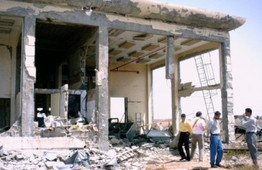
The Hamas government is working toward reopening the only airport in the Gaza Strip.
Named after Yasser Arafat, the airport, which is located close to the Egyptian border, opened in 1998, when the Palestinian Authority was still in control of the Gaza Strip.
The airport was closed in 2001 after being damaged by the IDF.
Ziad al-Thatha, Hamas's deputy prime minister, said that his government has asked the Egyptians to help reopen the airport. He did not say when and if it would resume operations.
It is also not clear whether the PA leadership in the West Bank would allow Hamas to run the facility.
In the past, the PA opposed the presence of Hamas representatives at the Rafah border crossing between the Gaza Strip and Egypt.
The Hamas official, who headed his movement's delegation to the recent Egyptian- sponsored cease-fire talks with Israel, said that Israel has agreed to allow construction material into the Gaza Strip.
He said that understandings reached with Israel and Egypt also permit the export of agricultural products, furniture and clothes from the Strip.
Thatha did not say whether the Egyptians had agreed to discuss the issue of the airport with Israel.
The airport was built with funding from Japan, Saudi Arabia, Spain, Germany and Egypt. It was designed by Moroccan architects and cost more than $85 million.
Meanwhile, a senior Hamas official in the Gaza Strip, Issa al- Nashar, announced that Khaled Mashaal, chairman of the Hamas Political Bureau, is expected to visit the Gaza Strip Thursday for the first time.
Nashar said that Mashaal and other Hamas leaders would participate in celebrations marking the anniversary of the founding of the Islamist movement and "victory" over Israel during last month's Operation Pillar of Defense.
"This is an historic visit," he said. "It comes in the aftermath of our big victory."
Nashar said Mashaal would be accompanied by his deputy, Musa Abu Marzouk.
Named after Yasser Arafat, the airport, which is located close to the Egyptian border, opened in 1998, when the Palestinian Authority was still in control of the Gaza Strip.
The airport was closed in 2001 after being damaged by the IDF.
Ziad al-Thatha, Hamas's deputy prime minister, said that his government has asked the Egyptians to help reopen the airport. He did not say when and if it would resume operations.
It is also not clear whether the PA leadership in the West Bank would allow Hamas to run the facility.
In the past, the PA opposed the presence of Hamas representatives at the Rafah border crossing between the Gaza Strip and Egypt.
The Hamas official, who headed his movement's delegation to the recent Egyptian- sponsored cease-fire talks with Israel, said that Israel has agreed to allow construction material into the Gaza Strip.
He said that understandings reached with Israel and Egypt also permit the export of agricultural products, furniture and clothes from the Strip.
Thatha did not say whether the Egyptians had agreed to discuss the issue of the airport with Israel.
The airport was built with funding from Japan, Saudi Arabia, Spain, Germany and Egypt. It was designed by Moroccan architects and cost more than $85 million.
Meanwhile, a senior Hamas official in the Gaza Strip, Issa al- Nashar, announced that Khaled Mashaal, chairman of the Hamas Political Bureau, is expected to visit the Gaza Strip Thursday for the first time.
Nashar said that Mashaal and other Hamas leaders would participate in celebrations marking the anniversary of the founding of the Islamist movement and "victory" over Israel during last month's Operation Pillar of Defense.
"This is an historic visit," he said. "It comes in the aftermath of our big victory."
Nashar said Mashaal would be accompanied by his deputy, Musa Abu Marzouk.
3 dec 2012
Haniyeh urges friendly states to help Gaza rebuild
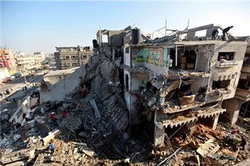
By Nidal al-Mughrabi
Gaza's prime minister has appealed to Arab states and friends of the Palestinian people to help pay for reconstruction after a week of Israeli aerial attacks on the enclave inflicted damage assessed at between $250 million and $545 million.
"We urge Arab brothers and the international community to stand beside the Palestinian people and Gaza in order that we can reconstruct what has been destroyed by the occupation (Israel) and to rehabilitate the infrastructure," Ismail Haniyeh told Reuters Television.
Haniyeh noted that Gaza had still not recovered from destruction suffered in a three-week war with Israel in December 2008-January 2009.
Donor states pledged some $4.8 billion for Gaza reconstruction in 2009 but little of that promised aid has materialized, apart from $400 million guaranteed by the wealthy Gulf emirate of Qatar just weeks before the latest conflict.
Israel and Haniyeh's Islamist movement Hamas, which rules the Gaza Strip, agreed to an Egyptian-drafted ceasefire two weeks ago to end eight days of fighting, which began when Israel assassinated Hamas military commander Ahmed al-Jaabari on Nov. 14.
About 170 Palestinians, more than half civilians, were killed in the assault, which also injured over 1,000 people.
Six Israelis were also killed, four of them civilians.
Different bills
Estimates varied of the extent of property damage and business losses in Gaza, a small, widely impoverished coastal enclave of 1.7 million Palestinians.
Hamas administration spokesman Taher al-Nunu put direct losses at $545 million. Counting indirect losses the total was about $700 million, he said. Nunu said 200 residential buildings and dozens of government offices were destroyed.
Omar Shaban, a prominent Gaza economist, estimated direct losses from destroyed buildings, security compounds and infrastructure at around $250 million, in addition to $24 million in indirect losses arising from the suspension of production in factories and businesses.
Shaban expected Qatar would be among the first to offer aid.
The Israeli government has issued no figures on economic losses during the conflict, which disrupted life mainly in the south of the country and led to the mobilization of some 40,000 military reserve troops.
The Israeli financial news daily Globes, citing figures from economists and business groups, estimated the loss of production at 0.2 percent of gross domestic product, or 2 billion shekels ($518 million).
Direct damage from Palestinian rocket fire that hit homes, cars and factories was about 25 million shekels ($6.5 million), the business information firm BDI said.
Israel's Finance Ministry has said it plans to compensate those who suffered damage and for lost wages in the south.
Gaza's prime minister has appealed to Arab states and friends of the Palestinian people to help pay for reconstruction after a week of Israeli aerial attacks on the enclave inflicted damage assessed at between $250 million and $545 million.
"We urge Arab brothers and the international community to stand beside the Palestinian people and Gaza in order that we can reconstruct what has been destroyed by the occupation (Israel) and to rehabilitate the infrastructure," Ismail Haniyeh told Reuters Television.
Haniyeh noted that Gaza had still not recovered from destruction suffered in a three-week war with Israel in December 2008-January 2009.
Donor states pledged some $4.8 billion for Gaza reconstruction in 2009 but little of that promised aid has materialized, apart from $400 million guaranteed by the wealthy Gulf emirate of Qatar just weeks before the latest conflict.
Israel and Haniyeh's Islamist movement Hamas, which rules the Gaza Strip, agreed to an Egyptian-drafted ceasefire two weeks ago to end eight days of fighting, which began when Israel assassinated Hamas military commander Ahmed al-Jaabari on Nov. 14.
About 170 Palestinians, more than half civilians, were killed in the assault, which also injured over 1,000 people.
Six Israelis were also killed, four of them civilians.
Different bills
Estimates varied of the extent of property damage and business losses in Gaza, a small, widely impoverished coastal enclave of 1.7 million Palestinians.
Hamas administration spokesman Taher al-Nunu put direct losses at $545 million. Counting indirect losses the total was about $700 million, he said. Nunu said 200 residential buildings and dozens of government offices were destroyed.
Omar Shaban, a prominent Gaza economist, estimated direct losses from destroyed buildings, security compounds and infrastructure at around $250 million, in addition to $24 million in indirect losses arising from the suspension of production in factories and businesses.
Shaban expected Qatar would be among the first to offer aid.
The Israeli government has issued no figures on economic losses during the conflict, which disrupted life mainly in the south of the country and led to the mobilization of some 40,000 military reserve troops.
The Israeli financial news daily Globes, citing figures from economists and business groups, estimated the loss of production at 0.2 percent of gross domestic product, or 2 billion shekels ($518 million).
Direct damage from Palestinian rocket fire that hit homes, cars and factories was about 25 million shekels ($6.5 million), the business information firm BDI said.
Israel's Finance Ministry has said it plans to compensate those who suffered damage and for lost wages in the south.
28 nov 2012
FIFA Asks Help to Rebuild Gaza Stadium
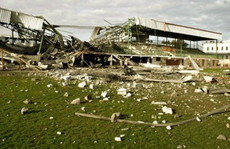
by Ynet
FIFA secretary-general Jerome Valcke has pledged that soccer's world governing body will help rebuild the Palestine Stadium in Gaza City, after it was partially destroyed in Israeli air strikes.
"We see it our mandate to rebuild football infrastructure which has been destroyed," Valcke was quoted as saying on fifa.com. "We will also rebuild the stadium in Gaza, which has been destroyed.
"Soccer brings people together and we will support any re-construction necessary when football infrastructure is destroyed through disasters," added Valcke, who is in Brazil for the draw of the Confederations Cup.
Israeli fighter jets opened fire on the venue in the Gaza Strip earlier this month, severely damaging an indoor hall and a neighbouring building as well as leaving four large holes on the pitch.
Reports have estimated that the cost of the damage at the 10,000-seat stadium could run into millions of dollars.
The venue is one of three international stadiums used by the Palestine national soccer team, with a second the West Bank and a third in annexed east Jerusalem.
The Israeli military claimed that the stadium had been used for launching Fajr 5 rockets towards Israel's two major cities.
"The stadium's compound was used to launch rockets at Jerusalem and Tel Aviv," a military spokeswoman told AFP on Tuesday, referring to an Iranian-made rocket which has a range of up to 75 kilometres (46 miles).
FIFA, a non-political body that has previously supported soccer development projects in the Gaza Strip and West Bank as well as Israel, similarly pledged to rebuild the stadium after it was attacked in 2006.
FIFA secretary-general Jerome Valcke has pledged that soccer's world governing body will help rebuild the Palestine Stadium in Gaza City, after it was partially destroyed in Israeli air strikes.
"We see it our mandate to rebuild football infrastructure which has been destroyed," Valcke was quoted as saying on fifa.com. "We will also rebuild the stadium in Gaza, which has been destroyed.
"Soccer brings people together and we will support any re-construction necessary when football infrastructure is destroyed through disasters," added Valcke, who is in Brazil for the draw of the Confederations Cup.
Israeli fighter jets opened fire on the venue in the Gaza Strip earlier this month, severely damaging an indoor hall and a neighbouring building as well as leaving four large holes on the pitch.
Reports have estimated that the cost of the damage at the 10,000-seat stadium could run into millions of dollars.
The venue is one of three international stadiums used by the Palestine national soccer team, with a second the West Bank and a third in annexed east Jerusalem.
The Israeli military claimed that the stadium had been used for launching Fajr 5 rockets towards Israel's two major cities.
"The stadium's compound was used to launch rockets at Jerusalem and Tel Aviv," a military spokeswoman told AFP on Tuesday, referring to an Iranian-made rocket which has a range of up to 75 kilometres (46 miles).
FIFA, a non-political body that has previously supported soccer development projects in the Gaza Strip and West Bank as well as Israel, similarly pledged to rebuild the stadium after it was attacked in 2006.
